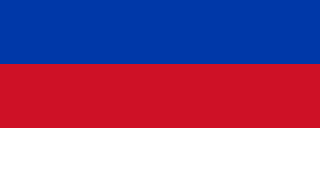
The Sorbian languages are the Upper Sorbian language and Lower Sorbian language, two closely related and partially mutually intelligible languages spoken by the Sorbs, a West Slavic ethno-cultural minority in the Lusatia region of Eastern Germany. They are classified under the West Slavic branch of the Indo-European languages and are therefore closely related to the other two West Slavic subgroups: Lechitic and Czech–Slovak. Historically, the languages have also been known as Wendish or Lusatian. Their collective ISO 639-2 code is wen.

Wends is a historical name for Slavs living near Germanic settlement areas. It refers not to a homogeneous people, but to various peoples, tribes or groups depending on where and when it was used. In the modern day, communities identifying as Wendish exist in Slovenia, Austria, Lusatia, Texas, and Australia.

Cottbus or Chóśebuz is a university city and the second-largest city in the German state of Brandenburg after the state capital of Potsdam. With around 98,000 inhabitants, it is the most populous city in Lusatia. Cottbus lies in the Sorbian settlement area of Lower Lusatia, and is the second-largest city on the River Spree after Berlin, from which it is situated around 125 km (78 mi) upstream. The city is located on the shores of Cottbus Eastern Lake, which will be Germany's largest artificial lake by surface area when flooding is completed.

Sorbs are an indigenous West Slavic ethnic group predominantly inhabiting the parts of Lusatia located in the German states of Saxony and Brandenburg. Sorbs traditionally speak the Sorbian languages, which are closely related to Czech, Polish, Kashubian, Silesian, and Slovak. Upper Sorbian and Lower Sorbian are officially recognized minority languages in Germany.

Lusatia is a historical region in Central Europe, split between Germany and Poland. Lusatia stretches from the Bóbr and Kwisa rivers in the east to the Pulsnitz and Black Elster rivers in the west, and is located within the German states of Saxony and Brandenburg as well as in the Polish voivodeships of Lower Silesia and Lubusz. Lusatia's central rivers are the Spree and the Lusatian Neisse, which constitutes the border between Germany and Poland since 1945. The Lusatian Mountains, separate Lusatia from Bohemia in the south. Lusatia is traditionally divided into Upper Lusatia and Lower Lusatia.
Upper Sorbian, occasionally referred to as "Wendish", is a minority language spoken by Sorbs in Germany in the historical province of Upper Lusatia, which is today part of Saxony. It is grouped in the West Slavic language branch, together with Lower Sorbian, Czech, Polish, Slovak and Kashubian.

The West Slavic languages are a subdivision of the Slavic language group. They include Polish, Czech, Slovak, Kashubian, Upper Sorbian and Lower Sorbian. The languages have traditionally been spoken across a mostly continuous region encompassing the Czech Republic, Slovakia, Poland, the westernmost regions of Ukraine and Belarus, and a bit of eastern Lithuania. In addition, there are several language islands such as the Sorbian areas in Lusatia in Germany, and Slovak areas in Hungary and elsewhere.

The Bohemian Forest, known in Czech as Šumava and in German as Böhmerwald, is a low mountain range in Central Europe. Geographically, the mountains extend from Plzeň Region and South Bohemia in the Czech Republic to Austria and Bavaria in Germany, and form the highest truncated uplands of the Bohemian Massif, up to 50 km wide. They create a natural border between the Czech Republic on one side and Germany and Austria on the other.

Polabian Slavs is a collective term applied to a number of Lechitic tribes who lived scattered along the Elbe river in what is today eastern Germany. The approximate territory stretched from the Baltic Sea in the north, the Saale and the Limes Saxoniae in the west, the Ore Mountains and the Western Sudetes in the south, and Poland in the east. They have also been known as Elbe Slavs or Wends. Their name derives from the Slavic po, meaning "by/next to/along", and the Slavic name for the Elbe.
The Serbs trace their history to the 6th and 7th-century Balkan migration of the Early Slavs. These migrants absorbed the local Byzantines, mostly descendants of different paleo-Balkan peoples, but also of other former Roman citizens, and later established various states throughout the Middle Ages.

Upper Lusatia is a historical region in Germany and Poland. Along with Lower Lusatia to the north, it makes up the region of Lusatia, named after the Slavic Lusici tribe. Both parts of Lusatia are home to the West Slavic minority group of the Sorbs.

The West Slavs are Slavic peoples who speak the West Slavic languages. They separated from the common Slavic group around the 7th century, and established independent polities in Central Europe by the 8th to 9th centuries. The West Slavic languages diversified into their historically attested forms over the 10th to 14th centuries.

The Milceni or Milzeni were a West Slavic tribe, who settled in the present-day Upper Lusatia region. They were first mentioned in the middle of the 9th century AD by the Bavarian Geographer, who wrote of 30 civitates which possibly had fortifications. They were gradually conquered by Germans during the 10th century. Modern descendants of the Milceni are the Sorbs of the Free State of Saxony, Germany.

The Sorbs, also known as White Serbs in Serbian historiography, were an Early Slavic tribe settled between Saale-Elbe valley up to Lusatian Neisse, and part of the Wends. In the 7th century, the tribe joined Samo's Empire and part of them emigrated from their homeland White Serbia to the Balkans. The tribe is last mentioned in the late 10th century, but its descendants are an ethnic group of Sorbs and Serbs.

The Sorbian settlement area commonly makes reference to the area in the east of Saxony and the South of Brandenburg in which the West Slavic people of the Sorbs live autochthonously. In colloquial German, it is called Sorbenland ; before 1945 also – sometimes pejoratively – called Wendei.












